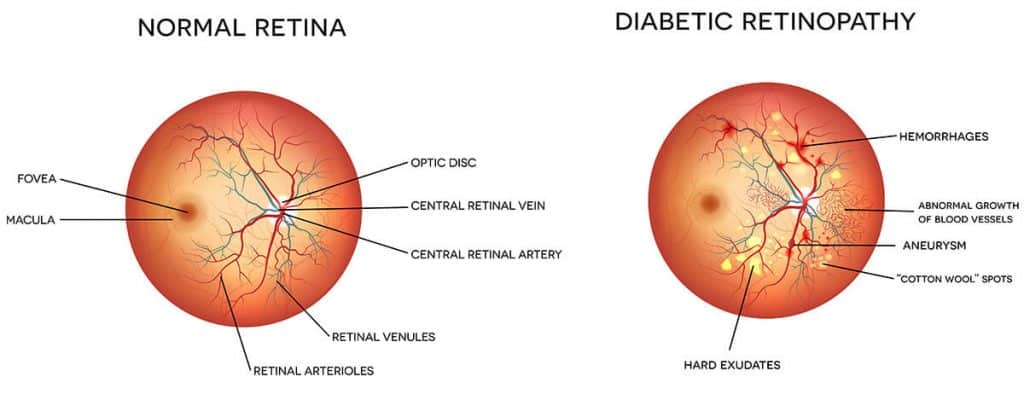What is Diabetic Retinopathy?
Diabetic retinopathy affects the blood vessels in the retina (the light-sensitive tissue at the back of the eye).
In the early stages of the disease, you can manage vision loss from diabetic retinopathy with regular eye exams and proper medical management of diabetes. However, diabetic retinopathy can lead to severe vision loss and blindness if diabetes is not under control. The blood vessels may leak fluid, or new, abnormal blood vessels may grow on the retina’s surface. There are laser treatments, eye medications, injections, and surgical options available if the disease begins to progress and cause vision loss. Call or request an appointment with the expert doctors of Desert Retina Consultants to learn more.
What are the Types of Diabetic Retinopathy?
Non-proliferative retinopathy
(NPDR)
Non-proliferative retinopathy (NPDR) is the early stage of the disease. Small areas of swelling occur, and the capillaries can begin to leak. Eventually, the blood vessels to the macula can close off.
Proliferative retinopathy
(PDR)
Proliferative retinopathy (PDR) is an advanced stage of retinopathy. Growth factors generate new blood vessels that grow along the retina’s surface and into the vitreous gel; the fluid that fills the back of the eye. The fragile blood vessels often bleed and leak.
Diabetic Macular Edema
(DME)
Diabetic Macular Edema (DME) often occurs with diabetic retinopathy. Fluid, called edema builds up in the macula, the central part of the retina. Macular edema can damage the central vision if not treated promptly.

Schedule a Consultation
Want to learn more about Diabetic Retinopathy and the treatment options available at Desert Retina Consultants? Click the button below to request an appointment today!
Request an Appointment
What are the symptoms of Diabetic Retinopathy?
You can have diabetic retinopathy and not know it. This is because it often has no symptoms in its early stages. As diabetic retinopathy gets worse, you will notice symptoms such as:
- Blurry vision, or vision that changes from blurry to clear
- An increasing number of floaters
- Blank or dark areas in the field of vision
- Poor night vision
- Colors appear dim or faded
How is Diabetic Retinopathy Treated?
Patients with very early diabetic retinopathy symptoms should schedule regular eye exams to ensure proper management of their disease. Desert Retina Consultants can help manage your diabetic retinopathy to preserve and protect your vision.
Treatments for Diabetic Retinopathy include:
- Reasonable control of blood sugar and blood pressure can stave off the progression of diabetic retinopathy.
- Adherence to a diabetic diet and compliance with taking diabetic medications as prescribed is essential to controlling blood sugar.
- Intra-vitreal (Anti-VEGF) injections can control swelling of the macula.
- Intra-vitreal injections of steroids (in selective cases)
- Laser treatments may be used to help seal off leaking blood vessels and stop swelling of the retina.
- In advanced cases of PDR, vitrectomy surgery may be recommended to remove blood and scar tissue from the back of the eye.









